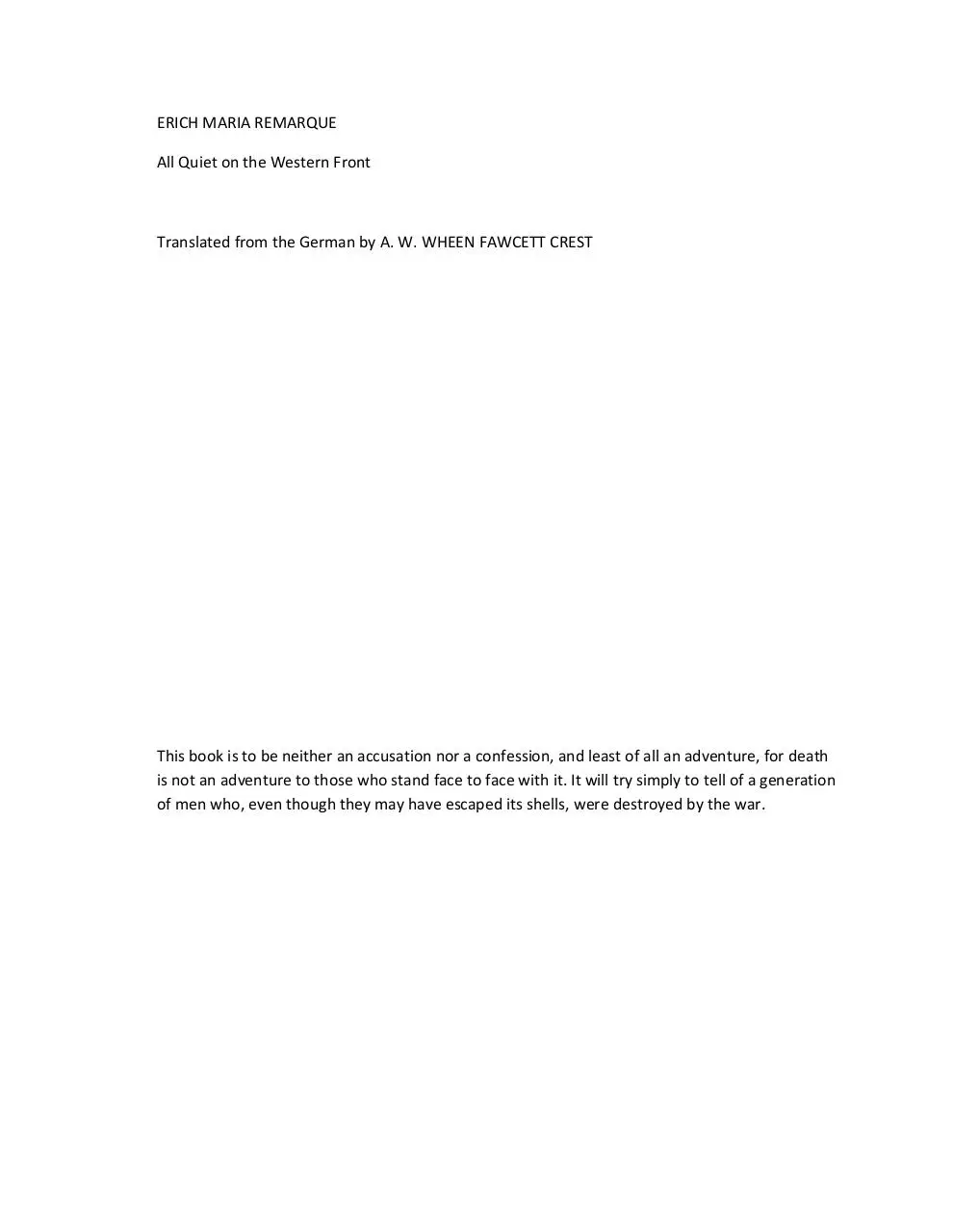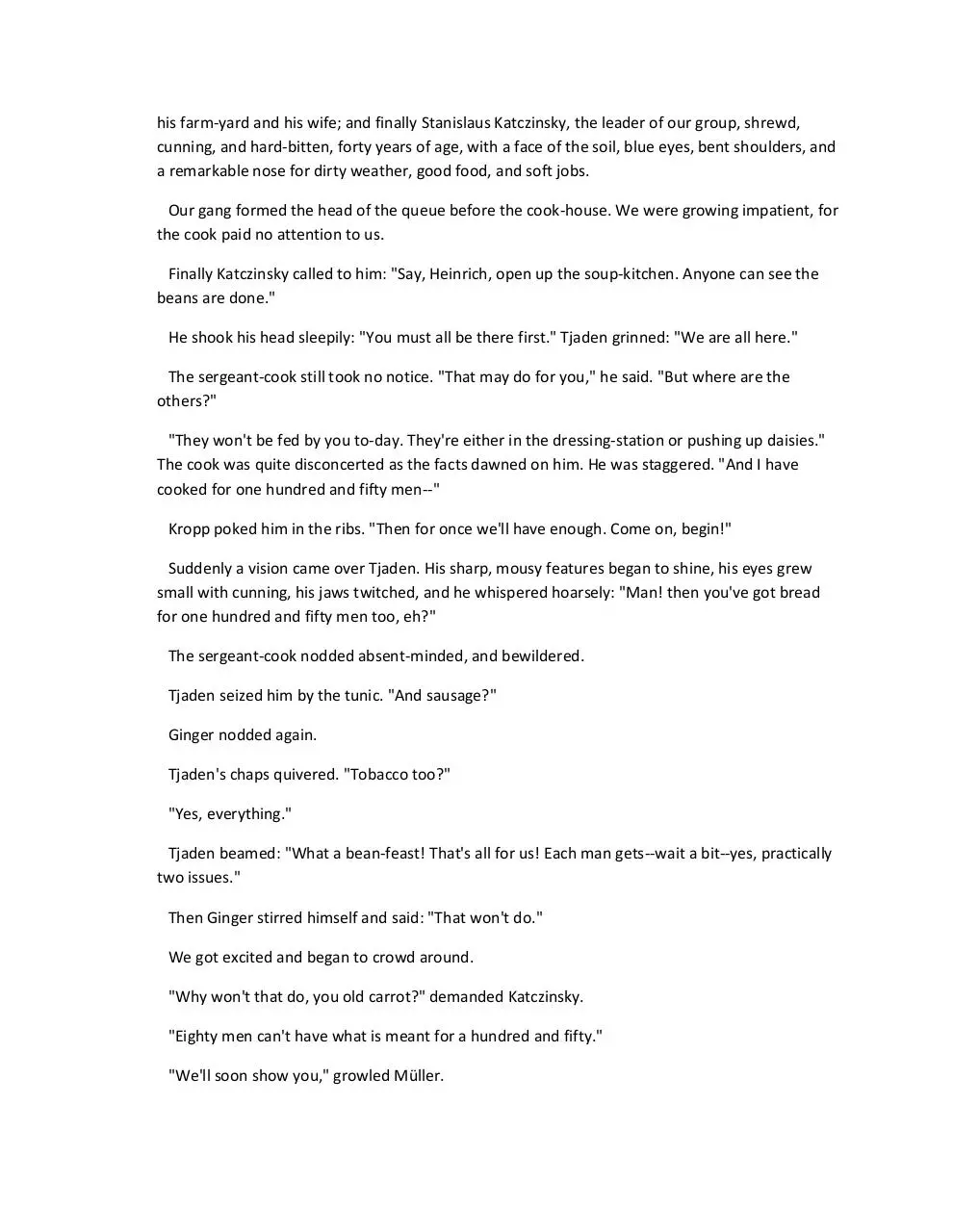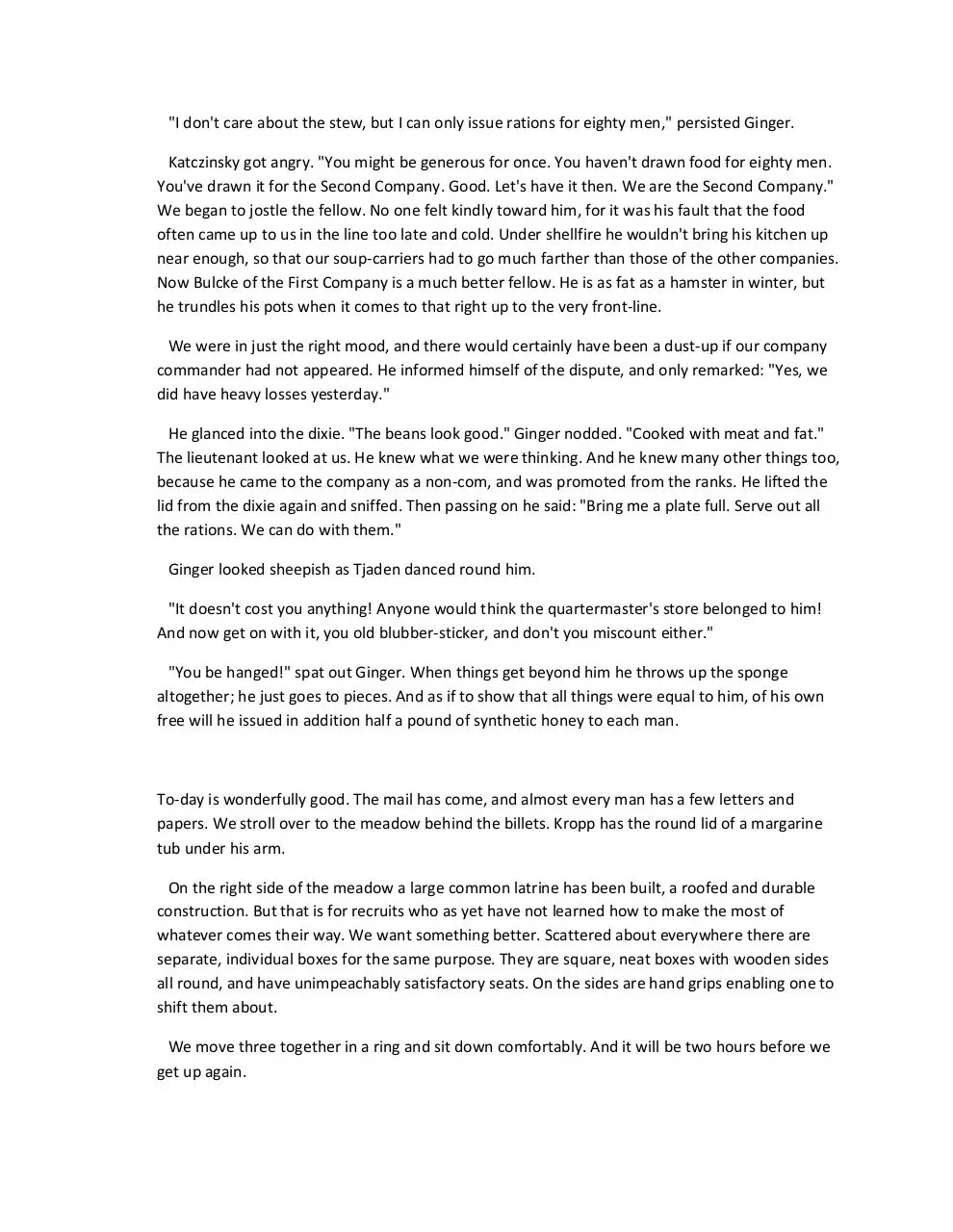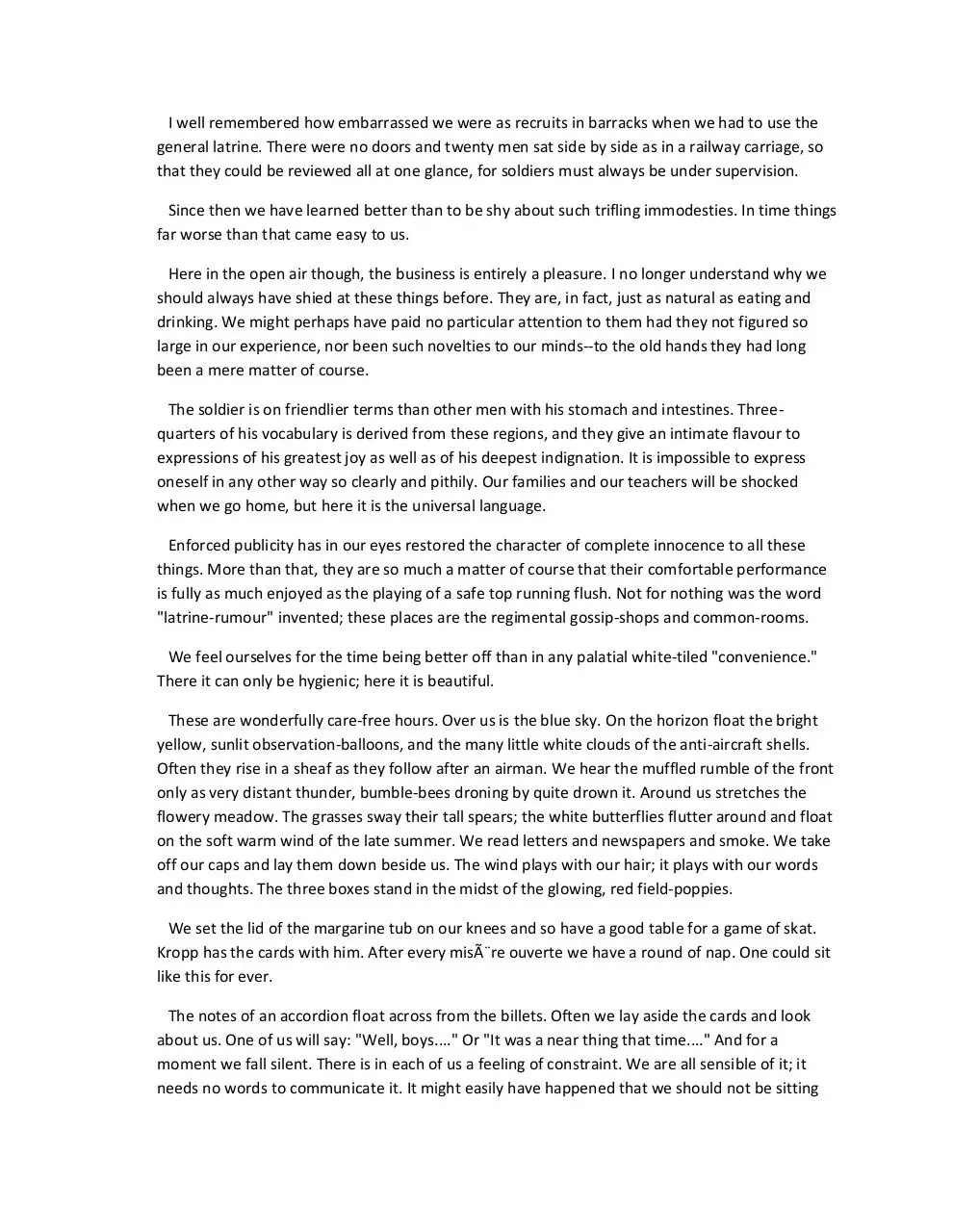AQWF full text (PDF)
File information
Author: beth
This PDF 1.5 document has been generated by Microsoft® Office Word 2007, and has been sent on pdf-archive.com on 12/05/2016 at 17:11, from IP address 50.77.x.x.
The current document download page has been viewed 8096 times.
File size: 631.83 KB (140 pages).
Privacy: public file





File preview
ERICH MARIA REMARQUE
All Quiet on the Western Front
Translated from the German by A. W. WHEEN FAWCETT CREST
This book is to be neither an accusation nor a confession, and least of all an adventure, for death
is not an adventure to those who stand face to face with it. It will try simply to tell of a generation
of men who, even though they may have escaped its shells, were destroyed by the war.
ONE
We are at rest five miles behind the front. Yesterday we were relieved, and now our bellies are
full of beef and haricot beans. We are satisfied and at peace. Each man has another mess-tin full
for the evening; and, what is more, there is a double ration of sausage and bread. That puts a man
in fine trim. We have not had such luck as this for a long time. The cook with his carroty head is
begging us to eat; he beckons with his ladle to every one that passes, and spoons him out a great
dollop. He does not see how he can empty his stew-pot in time for coffee. Tjaden and Müller have
produced two washbasins and had them filled up to the brim as a reserve. In Tjaden this is
voracity, in Müller it is foresight. Where Tjaden puts it all is a mystery, for he is and always will be
as thin as a rake. What's more important still is the issue of a double ration of smokes. Ten cigars,
twenty cigarettes, and two quids of chew per man; now that is decent. I have exchanged my
chewing tobacco with Katczinsky for his cigarettes, which means I have forty altogether. That's
enough for a day.
It is true we have no right to this windfall. The Prussian is not so generous. We have only a
miscalculation to thank for it.
Fourteen days ago we had to go up and relieve the front line. It was fairly quiet on our sector, so
the quartermaster who remained in the rear had requisitioned the usual quantity of rations and
provided for the full company of one hundred and fifty men. But on the last day an astonishing
number of English heavies opened up on us with high-explosive, drumming ceaselessly on our
position, so that we suffered severely and came back only eighty strong.
Last night we moved back and settled down to get a good sleep for once: Katczinsky is right
when he says it would not be such a bad war if only one could get a little more sleep. In the line
we have had next to none, and fourteen days is a long time at one stretch.
It was noon before the first of us crawled out of our quarters. Half an hour later every man had
his mess-tin and we gathered at the cookhouse, which smelt greasy and nourishing. At the head
of the queue of course were the hungriest--little Albert Kropp, the clearest thinker among us and
therefore only a lance-corporal; Müller, who still carries his school textbooks with him, dreams of
examinations, and during a bombardment mutters propositions in physics; Leer, who wears a full
beard and has a preference for the girls from officers' brothels. He swears that they are obliged by
an army order to wear silk chemises and to bathe before entertaining guests of the rank of
captain and upwards. And as the fourth, myself, Paul Bäumer. And four are nineteen years of
age, and all four joined up from the same class as volunteers for the war.
Close behind us were our friends: Tjaden, a skinny locksmith of our own age, the biggest eater of
the company. He sits down to eat as thin as a grasshopper and gets up as big as a bug in the
family way; Haie Westhus, of the same age, a peat-digger, who can easily hold a ration-loaf in his
hand and say: Guess what I've got in my fist; then Detering, a peasant, who thinks of nothing but
his farm-yard and his wife; and finally Stanislaus Katczinsky, the leader of our group, shrewd,
cunning, and hard-bitten, forty years of age, with a face of the soil, blue eyes, bent shoulders, and
a remarkable nose for dirty weather, good food, and soft jobs.
Our gang formed the head of the queue before the cook-house. We were growing impatient, for
the cook paid no attention to us.
Finally Katczinsky called to him: "Say, Heinrich, open up the soup-kitchen. Anyone can see the
beans are done."
He shook his head sleepily: "You must all be there first." Tjaden grinned: "We are all here."
The sergeant-cook still took no notice. "That may do for you," he said. "But where are the
others?"
"They won't be fed by you to-day. They're either in the dressing-station or pushing up daisies."
The cook was quite disconcerted as the facts dawned on him. He was staggered. "And I have
cooked for one hundred and fifty men--"
Kropp poked him in the ribs. "Then for once we'll have enough. Come on, begin!"
Suddenly a vision came over Tjaden. His sharp, mousy features began to shine, his eyes grew
small with cunning, his jaws twitched, and he whispered hoarsely: "Man! then you've got bread
for one hundred and fifty men too, eh?"
The sergeant-cook nodded absent-minded, and bewildered.
Tjaden seized him by the tunic. "And sausage?"
Ginger nodded again.
Tjaden's chaps quivered. "Tobacco too?"
"Yes, everything."
Tjaden beamed: "What a bean-feast! That's all for us! Each man gets--wait a bit--yes, practically
two issues."
Then Ginger stirred himself and said: "That won't do."
We got excited and began to crowd around.
"Why won't that do, you old carrot?" demanded Katczinsky.
"Eighty men can't have what is meant for a hundred and fifty."
"We'll soon show you," growled Müller.
"I don't care about the stew, but I can only issue rations for eighty men," persisted Ginger.
Katczinsky got angry. "You might be generous for once. You haven't drawn food for eighty men.
You've drawn it for the Second Company. Good. Let's have it then. We are the Second Company."
We began to jostle the fellow. No one felt kindly toward him, for it was his fault that the food
often came up to us in the line too late and cold. Under shellfire he wouldn't bring his kitchen up
near enough, so that our soup-carriers had to go much farther than those of the other companies.
Now Bulcke of the First Company is a much better fellow. He is as fat as a hamster in winter, but
he trundles his pots when it comes to that right up to the very front-line.
We were in just the right mood, and there would certainly have been a dust-up if our company
commander had not appeared. He informed himself of the dispute, and only remarked: "Yes, we
did have heavy losses yesterday."
He glanced into the dixie. "The beans look good." Ginger nodded. "Cooked with meat and fat."
The lieutenant looked at us. He knew what we were thinking. And he knew many other things too,
because he came to the company as a non-com, and was promoted from the ranks. He lifted the
lid from the dixie again and sniffed. Then passing on he said: "Bring me a plate full. Serve out all
the rations. We can do with them."
Ginger looked sheepish as Tjaden danced round him.
"It doesn't cost you anything! Anyone would think the quartermaster's store belonged to him!
And now get on with it, you old blubber-sticker, and don't you miscount either."
"You be hanged!" spat out Ginger. When things get beyond him he throws up the sponge
altogether; he just goes to pieces. And as if to show that all things were equal to him, of his own
free will he issued in addition half a pound of synthetic honey to each man.
To-day is wonderfully good. The mail has come, and almost every man has a few letters and
papers. We stroll over to the meadow behind the billets. Kropp has the round lid of a margarine
tub under his arm.
On the right side of the meadow a large common latrine has been built, a roofed and durable
construction. But that is for recruits who as yet have not learned how to make the most of
whatever comes their way. We want something better. Scattered about everywhere there are
separate, individual boxes for the same purpose. They are square, neat boxes with wooden sides
all round, and have unimpeachably satisfactory seats. On the sides are hand grips enabling one to
shift them about.
We move three together in a ring and sit down comfortably. And it will be two hours before we
get up again.
I well remembered how embarrassed we were as recruits in barracks when we had to use the
general latrine. There were no doors and twenty men sat side by side as in a railway carriage, so
that they could be reviewed all at one glance, for soldiers must always be under supervision.
Since then we have learned better than to be shy about such trifling immodesties. In time things
far worse than that came easy to us.
Here in the open air though, the business is entirely a pleasure. I no longer understand why we
should always have shied at these things before. They are, in fact, just as natural as eating and
drinking. We might perhaps have paid no particular attention to them had they not figured so
large in our experience, nor been such novelties to our minds--to the old hands they had long
been a mere matter of course.
The soldier is on friendlier terms than other men with his stomach and intestines. Threequarters of his vocabulary is derived from these regions, and they give an intimate flavour to
expressions of his greatest joy as well as of his deepest indignation. It is impossible to express
oneself in any other way so clearly and pithily. Our families and our teachers will be shocked
when we go home, but here it is the universal language.
Enforced publicity has in our eyes restored the character of complete innocence to all these
things. More than that, they are so much a matter of course that their comfortable performance
is fully as much enjoyed as the playing of a safe top running flush. Not for nothing was the word
"latrine-rumour" invented; these places are the regimental gossip-shops and common-rooms.
We feel ourselves for the time being better off than in any palatial white-tiled "convenience."
There it can only be hygienic; here it is beautiful.
These are wonderfully care-free hours. Over us is the blue sky. On the horizon float the bright
yellow, sunlit observation-balloons, and the many little white clouds of the anti-aircraft shells.
Often they rise in a sheaf as they follow after an airman. We hear the muffled rumble of the front
only as very distant thunder, bumble-bees droning by quite drown it. Around us stretches the
flowery meadow. The grasses sway their tall spears; the white butterflies flutter around and float
on the soft warm wind of the late summer. We read letters and newspapers and smoke. We take
off our caps and lay them down beside us. The wind plays with our hair; it plays with our words
and thoughts. The three boxes stand in the midst of the glowing, red field-poppies.
We set the lid of the margarine tub on our knees and so have a good table for a game of skat.
Kropp has the cards with him. After every misère ouverte we have a round of nap. One could sit
like this for ever.
The notes of an accordion float across from the billets. Often we lay aside the cards and look
about us. One of us will say: "Well, boys...." Or "It was a near thing that time...." And for a
moment we fall silent. There is in each of us a feeling of constraint. We are all sensible of it; it
needs no words to communicate it. It might easily have happened that we should not be sitting
here on our boxes to-day; it came damn near to that. And so everything is new and brave, red
poppies and good food, cigarettes and summer breeze.
Kropp asks: "Anyone seen Kemmerich lately?"
"He's up at St. Joseph's," I tell him.
Müller explains that he has a flesh wound in his thigh; a good blighty.
We decide to go and see him this afternoon.
Kropp pulls out a letter. "Kantorek sends you all his best wishes."
We laugh. Müller throws his cigarette away and says: "I wish he was here."
Kantorek had been our schoolmaster, a stern little man in a grey tailcoat, with a face like a shrew
mouse. He was about the same size as Corporal Himmelstoss, the "terror of Klosterberg." It is very
queer that the unhappiness of the world is so often brought on by small men. They are so much
more energetic and uncompromising than the big fellows. I have always taken good care to keep
out of sections with small company commanders. They are mostly confounded little martinets.
During drill-time Kantorek gave us long lectures until the whole of our class went, under his
shepherding, to the District Commandant and volunteered. I can see him now, as he used to glare
at us through his spectacles and say in a moving voice: "Won't you join up, Comrades?"
These teachers always carry their feelings ready in their waistcoat pockets, and trot them out by
the hour. But we didn't think of that then.
There was, indeed, one of us who hesitated and did not want to fall into line. That was Joseph
Behm, a plump, homely fellow. But he did allow himself to be persuaded, otherwise he would
have been ostracised. And perhaps more of us thought as he did, but no one could very well stand
out, because at that time even one's parents were ready with the word "coward"; no one had the
vaguest idea what we were in for. The wisest were just the poor and simple people. They knew
the war to be a misfortune, whereas those who were better off, and should have been able to see
more clearly what the consequences would be, were beside themselves with joy.
Katczinsky said that was a result of their upbringing. It made them stupid. And what Kat said, he
had thought about.
Strange to say, Behm was one of the first to fall. He got hit in the eye during an attack, and we
left him lying for dead. We couldn't bring him with us, because we had to come back helterskelter. In the afternoon suddenly we heard him call, and saw him crawling about in No Man's
Land. He had only been knocked unconscious. Because he could not see, and was mad with pain,
he failed to keep under cover, and so was shot down before anyone could go and fetch him in.
Naturally we couldn't blame Kantorek for this. Where would the world be if one brought every
man to book? There were thousands of Kantoreks, all of whom were convinced that they were
acting for the best--in a way that cost them nothing.
And that is why they let us down so badly.
For us lads of eighteen they ought to have been mediators and guides to the world of maturity,
the world of work, of duty, of culture, of progress--to the future. We often made fun of them and
played jokes on them, but in our hearts we trusted them. The idea of authority, which they
represented, was associated in our minds with a greater insight and a more humane wisdom. But
the first death we saw shattered this belief. We had to recognise that our generation was more to
be trusted than theirs.
They surpassed us only in phrases and in cleverness. The first bombardment showed us our
mistake, and under it the world as they had taught it to us broke in pieces.
While they continued to write and talk, we saw the wounded and dying. While they taught that
duty to one's country is the greatest thing, we already knew that death-throes are stronger. But
for all that we were no mutineers, no deserters, no cowards--they were very free with all these
expressions. We loved our country as much as they; we went courageously into every action; but
also we distinguished the false from true, we had suddenly learned to see. And we saw that there
was nothing of their world left. We were all at once terribly alone; and alone we must see it
through.
Before going over to see Kemmerich we pack up his things: he will need them on the way back.
In the dressing station there is great activity: it reeks as ever of carbolic, pus, and sweat. We are
accustomed to a good deal in the billets, but this makes us feel faint. We ask for Kemmerich. He
lies in a large room and receives us with feeble expressions of joy and helpless agitation. While he
was unconscious someone had stolen his watch.
Müller shakes his head: "I always told you that nobody should carry as good a watch as that."
Müller is rather crude and tactless, otherwise he would hold his tongue, for anybody can see
that Kemmerich will never come out of this place again. Whether he finds his watch or not will
make no difference, at the most one will only be able to send it to his people.
"How goes it, Franz?" asks Kropp.
Kemmerich's head sinks.
"Not so bad... but I have such a damned pain in my foot."
We look at his bed covering. His leg lies under a wire basket. The bed covering arches over it. I
kick Müller on the shin, for he is just about to tell Kemmerich what the orderlies told us outside:
that Kemmerich has lost his foot. The leg is amputated. He looks ghastly, yellow and wan. In his
face there are already the strained lines that we know so well, we have seen them now hundreds
of times. They are not so much lines as marks. Under the skin the life no longer pulses, it has
already pressed out the boundaries of the body. Death is working through from within. It already
has command in the eyes. Here lies our comrade, Kemmerich, who a little while ago was roasting
horse flesh with us and squatting in the shell-holes. He it is still and yet it is not he any longer. His
features have become uncertain and faint, like a photographic plate from which two pictures have
been taken. Even his voice sounds like ashes.
I think of the time when we went away. His mother, a good plump matron, brought him to the
station. She wept continually, her face was bloated and swollen. Kemmerich felt embarrassed, for
she was the least composed of all; she simply dissolved into fat and water. Then she caught sight
of me and took hold of my arm again and again, and implored me to look after Franz out there.
Indeed he did have a face like a child, and such frail bones that after four weeks' pack-carrying he
already had flat feet. But how can a man look after anyone in the field!
"Now you will soon be going home," says Kropp. "You would have had to wait at least three or
four months for your leave."
Kemmerich nods. I cannot bear to look at his hands, they are like wax. Under the nails is the dirt
of the trenches, it shows through blue-black like poison. It strikes me that these nails will continue
to grow like lean fantastic cellar-plants long after Kemmerich breathes no more. I see the picture
before me. They twist themselves into corkscrews and grow and grow, and with them the hair on
the decaying skull, just like grass in a good soil, just like grass, how can it be possible-- Müller
leans over. "We have brought your things, Franz."
Kemmerich signs with his hands. "Put them under the bed."
Müller does so. Kemmerich starts on again about the watch. How can one calm him without
making him suspicious?
Müller reappears with a pair of airman's boots. They are fine English boots of soft, yellow
leather which reach to the knees and lace up all the way--they are things to be coveted.
Müller is delighted at the sight of them. He matches their soles against his own clumsy boots
and says: "Will you be taking them with you then, Franz?"
We all three have the same thought; even if he should get better, he would be able to use only
one--they are no use to him. But as things are now it is a pity that they should stay here; the
orderlies will of course grab them as soon as he is dead, "Won't you leave them with us?" Müller
repeats.
Kemmerich doesn't want to. They are his most prized possessions.
"Well, we could exchange," suggests Müller again. "Out here one can make some use of them."
Still Kemmerich is not to be moved.
I tread on Müller's foot; reluctantly he puts the fine boots back again under the bed.
We talk a little more and then take our leave.
"Cheerio, Franz."
I promise him to come back in the morning. Müller talks of doing so, too. He is thinking of the
lace-up boots and means to be on the spot.
Kemmerich groans. He is feverish. We get hold of an orderly outside and ask him to give
Kemmerich a dose of morphia.
He refuses. "If we were to give morphia to everyone we would have to have tubs full--"
"You only attend to officers properly," says Kropp viciously.
I hastily intervene and give him a cigarette. He takes it.
"Are you usually allowed to give it, then?" I ask him.
He is annoyed. "If you don't think so, then why do you ask?"
I press a few more cigarettes into his hand. "Do us the favour--"
"Well, all right," he says.
Kropp goes in with him. He doesn't trust him and wants to see. We wait outside.
Müller returns to the subject of the boots. "They would fit me perfectly. In these boots I get
blister after blister. Do you think he will last till tomorrow after drill? If he passes out in the night,
we know where the boots--"
Kropp returns. "Do you think--?" he asks.
"Done for," says Müller emphatically.
We go back to the huts. I think of the letter that I must write tomorrow to Kemmerich's mother.
I am freezing. I could do with a tot of rum. Müller pulls up some grass and chews it. Suddenly little
Kropp throws his cigarette away, stamps on it savagely, and looking around him with a broken
and distracted face, stammers "Damned shit, the damned shit!"
We walk on for a long time. Kropp has calmed himself; we understand, he saw red; out here
every man gets like that sometime.
"What has Kantorek written to you?" Müller asks him.
Download AQWF - full text
AQWF - full text.pdf (PDF, 631.83 KB)
Download PDF
Share this file on social networks
Link to this page
Permanent link
Use the permanent link to the download page to share your document on Facebook, Twitter, LinkedIn, or directly with a contact by e-Mail, Messenger, Whatsapp, Line..
Short link
Use the short link to share your document on Twitter or by text message (SMS)
HTML Code
Copy the following HTML code to share your document on a Website or Blog
QR Code to this page

This file has been shared publicly by a user of PDF Archive.
Document ID: 0000371523.